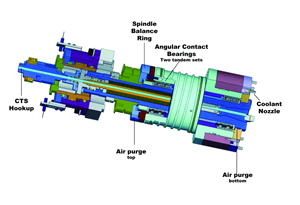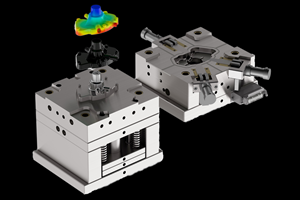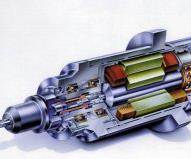Hyundai WIA’s FD Series of CNC VMCs were developed for high production environments with an integrated dual pallet configuration. The FD Series range includes the F410D (travels: 22.4” X-axis, 16” Y-axis, 23” Z-axis), F500D (travels: 23.6” X-axis, 18” Y-axis, 22.4” Z-axis) and the F600D (travels: 31.5” X-axis, 23.6” Y-axis, 23.6” Z-axis). Standard features include: a 24-tool (30-tool optional) swing arm tool changer, thru spindle coolant-and rigid tapping.
The FD Series machines benefit from the superior rigidity delivered through its unique traveling column design, the company notes. The table and work piece remain stationary during machining, providing uniform loads to the guideways, ballscrews and the spindle motor. Further, the machine’s accuracy is increased by enlarging the width of the column, thereby minimizing heat distortion within the casting. The dual, automatic 180-degree indexing dual pallet is incorporated into the standard design of the machine and is accessible from the front. Because the table remains stationary during cutting, productivity is increased and set-up time reduced due to the fact that the operator is free to safely set up on the pallet not in use. Pallet change time is a mere six seconds, the company adds.
The bed, column and saddle of Hyundai WIA’s FD Series are designed using finite element analysis (FEA) to ensure powerful cutting and agility and are composed of Meehanite cast iron to minimize deformation when performing heavy-duty cuts. The rigid bed is designed to absorb vibration for stable machining.
In order to eliminate thermal growth during machining, all axes are driven by high precision double-nut ballscrews. The double pretension design provides outstanding positioning and repeatability with virtually no thermal growth. All ballscrews are connected directly to the servo drive motors without gears or belts, eliminating backlash. Rapid high speed axis movement is achieved by the use of linear motion guide ways in all three axes. This reduces non-cutting time and decreases machining time for greater productivity. Rapid traverse: 36m/min in X- and Y-axis and 30 m/min in Z-axis for the F410D.
The FD Series can be configured with a 10,000 rpm spindle or with a 12,000 rpm spindle for high-speed precision applications. Ultra precision class angular bearings provide high speed accel/decel for smooth machining at high rpm’s. The main spindle delivers minimal noise and vibration even at the highest cutting speeds, guaranteeing extremely stable machining and minimizing thermal transmission to the main spindle, and with the use of a hydraulic tool lock system machining stability has been increased. Spindle motor is 20 to 25 hp with spindle torque rated at 287/143 Nm on the F600D.
Thru spindle coolant is standard on the FD Series. This feature is particularly useful for deep hole drilling where it’s necessary to keep chip flow clear of the cutting surface. Thru spindle coolant also helps to increase tool life and decrease cycle time.
Hyundai WIA’s FD Series machining centers are outfitted with 24-tool (30-tool optional), side mount swing arm type tool changers. This technology offers optimal performance with impressive tool change times of 1.6 sec tool-to-tool on the F410D and a 2.4 sec tool-to-tool on the F600D, according to the company. With a capacity up to 30 tools (plus one in the spindle) setup time is reduced and run times can be made longer, especially if loaded with redundant tools.
The 24 (30 optional) tool swing arm automatic tool changer and magazine are separated by a shutter system which closes during machining, thus keeping chips and fluids clear of the ATC and magazine. When a tool change is required, machining stops, the shutter opens, the ATC exchanges old tool for new, the shutter door then closes and machining begins again.
Related Content
Machining Center Spindles: What You Need to Know
Why and how to research spindle technology before purchasing a machining center.
Read MoreTips for Tackling Mold Design, Machining, Cutting Tool and Wear Challenges
Tips for tasks ranging from reducing risk in part design and taking advantage of five-axis machining to refining cutting tool performance and reducing wear with guiding and centering systems.
Read MoreDevelopments in High-Speed Machining Technology
There have been many exciting developments in high-speed machining relative to machining centers and controls, tooling and CAD/CAM systems.
Read MoreThree Good Reasons to Switch from Three- to Five-Axis Machining in Moldmaking
Five-axis machining technology is a great tool in the moldmaker toolbox.
Read MoreRead Next
Are You a Moldmaker Considering 3D Printing? Consider the 3D Printing Workshop at NPE2024
Presentations will cover 3D printing for mold tooling, material innovation, product development, bridge production and full-scale, high-volume additive manufacturing.
Read MoreHow to Use Strategic Planning Tools, Data to Manage the Human Side of Business
Q&A with Marion Wells, MMT EAB member and founder of Human Asset Management.
Read MoreReasons to Use Fiber Lasers for Mold Cleaning
Fiber lasers offer a simplicity, speed, control and portability, minimizing mold cleaning risks.
Read More















.jpg;maxWidth=300;quality=90)







